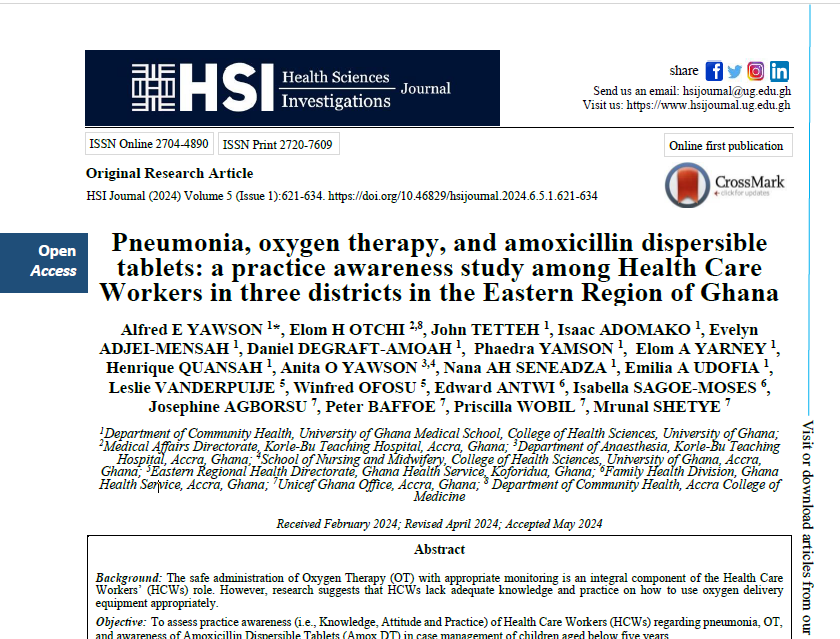Pneumonia, Oxygen Therapy, and Amoxicillin Dispersible Tablets: A practice awareness study among Health Care Workers in three districts in the Eastern Region of Ghana
Pneumonia, Oxygen Therapy, and Amoxicillin Dispersible Tablets
Abstract
Background: The safe administration of Oxygen Therapy (OT) with appropriate monitoring is an integral component of Health Care Workers (HCWs) role. However, research suggests that HCWs lack adequate knowledge and practice on how to appropriately use oxygen delivery equipment.
Objective: To assess practice awareness of Health Care Workers (HCWs) regarding pneumonia, OT, and awareness of Amoxicillin Dispersible Tablets (Amox DT) in case management of children aged below five years. Knowledge, attitude and practice (KAP) were compounded as practice awareness in this study.
Methods: Using a cross-sectional study design, 356 HCWs in public and private (self-financing and faith-based) health facilities in three districts (i.e., New Juaben North (NJN), New Juaben South (NJS), and Lower Manya Krobo (LMK) in the Eastern Region of Ghana were randomly selected. Workshop on Integrated Management of Neonatal and Childhood Illness (IMNCI) which included Amox-DT was organized for HCWs in the three districts in March, 2021 when the data was also collected. The study adopted both univariate and multivariate data analysis involving Robust Ordinary Least Square and Logistic regression analysis for continuous and binary outcomes respectively. All analyses were performed using Stata 16.1 and p<0.05 deemed statistically significant.
Result: The age of the participants ranged from 22-79 years and the mean±SD was 31.4±1.7 years. Staff distribution by sex showed female predominance (approximately 80% versus 17%). The overall levels of practice awareness related to oxygen therapy was 45.8%(95%CI=42.2-49.3), 41.4%(95%CI=39.9-42.9), and 32.9%(95%CI=30.2-35.7) respectively. Likewise, the overall practice awareness related to pneumonia was 69.2%(95%CI=67.5-70.7), 89.2%(95%CI=87.2-91.2) and 66.0%(95%CI=63.7-68.3) respectively. Practice awareness regarding OT and pneumonia were significantly influenced by the level of the facility, category and education level of the HCW. In addition, the pooled prevalence of awareness about Amox DT was 31.5%(95%CI=26.8-36.5). HCWs who attended IMNCI training workshop demonstrated greater awareness compared to those who did not [aOR(95%CI) = 2.28(1.28-4.06)]. In addition, HCW in New Juaben North (NJN) were more likely to be aware of Amox DT compared with those in New Juaben South (NJS) [aOR(95%CI) = 2.08(1.10-3.92)]. The IMNCI training workshop did not have a significant influence on the practice awareness regarding OT and pneumonia.
Conclusion: Level of practice awareness on management of pneumonia in children was low (approximately one-third of HCW). In-service training on IMNCI increased the level of awareness on Amox DT but not on OT for management of pneumonia. Training module for HCWs needs to be re-designed to improve practice skills and awareness on Amox DT and Oxygen therapy in the management of pneumonia in children.


